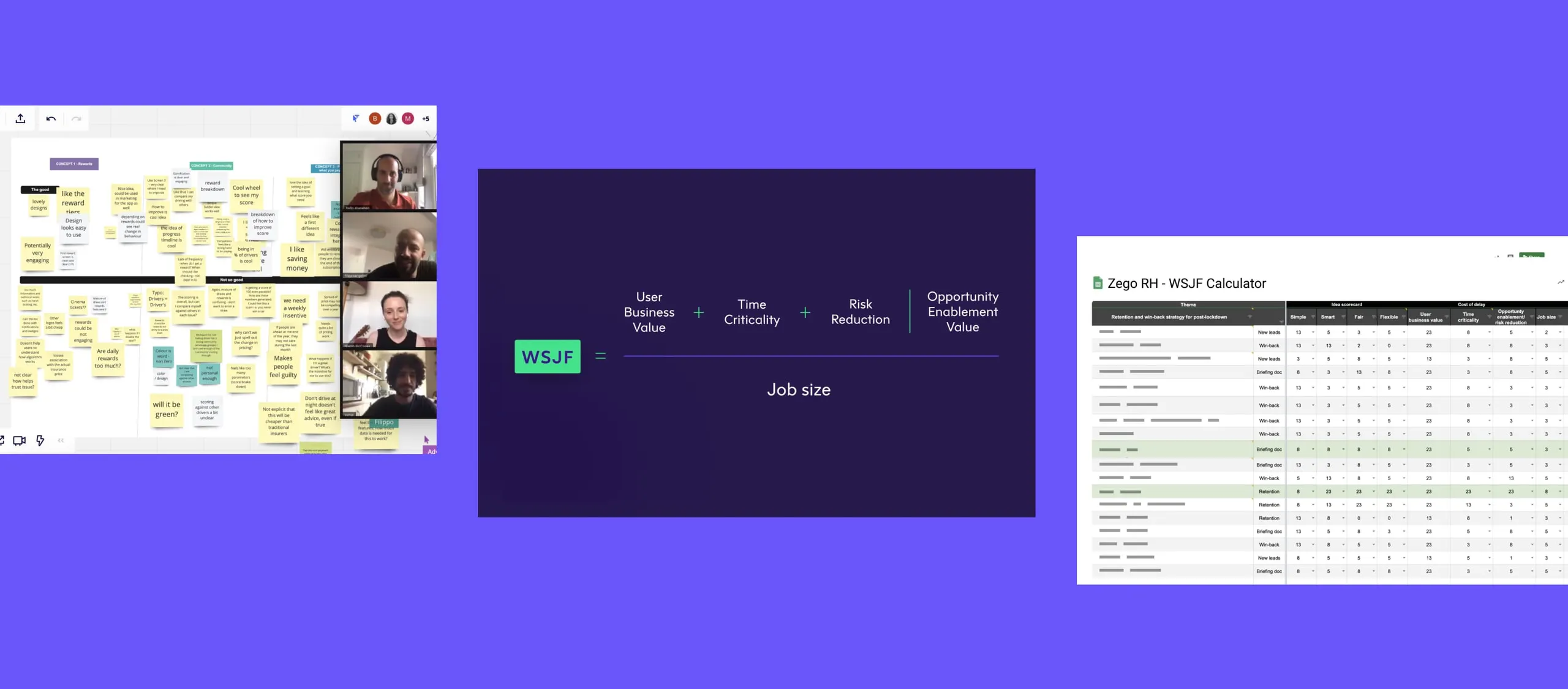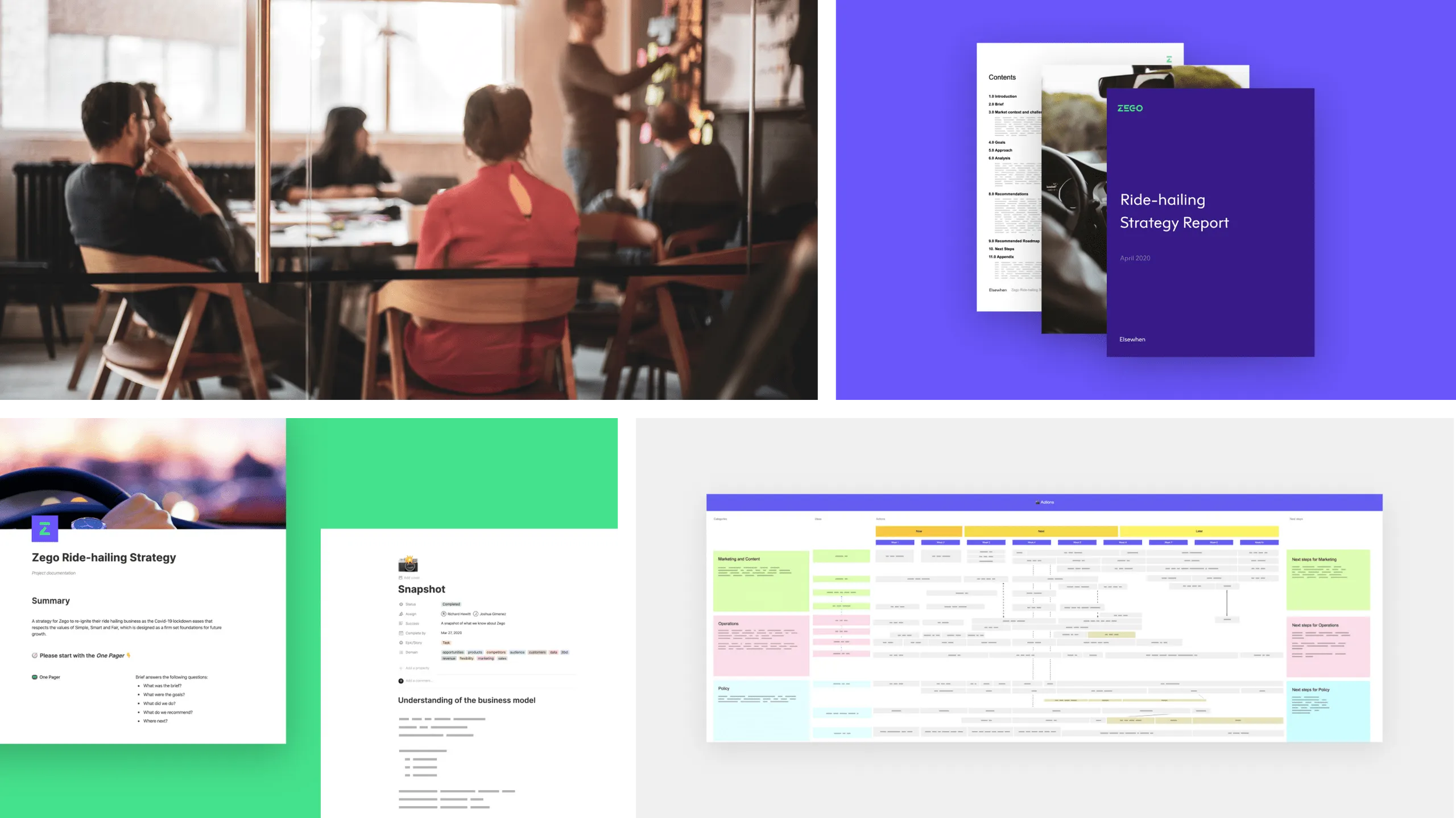
Implementing digital strategy at the UK’s biggest Insurtech
Summary
Zego provides on-demand insurance to partners like Uber, Deliveroo & JustEat, as well as to individual drivers and fleet owners. In an industry where decisions are often based just on price, Elsewhen helped Zego across several projects and business functions to differentiate from the competition, and weather the economic storm brought about by COVID-19. We delivered a digital strategy, a tactical rollout, and embedded new customer-centric ways-of-working.
- 12
- Weeks to delivery
- 45+
- Prioritised initiatives
- 70
- Point roadmap
- The brief
- 6 weeks to deliver a roadmap to rethink ride-hailing
Outcomes
- 20+ stakeholder interviews
- Deliverables in 5 weeks
- Prioritised WSJF initiatives
- Actionable roadmap
- Detailed strategy document
We were tasked by Zego to recommend a strategy to re-ignite their ride hailing business for when the COVID-19 lockdown eases, in a way that respects their values of ‘Simple, Smart and Fair’ and provides a firm set of foundations for future growth for the ride-hailing business. We set ourselves five weeks to do so.
We would need to run a thorough analysis of the ride-hailing vertical, its users and their needs, our senior product team co-creating with the Zego team a way forward, testing new ideas in the short term while creating a long term vision.
We began by seeking a thorough understanding of Zego’s ride-hailing business to generate a pool of feasible ideas to be launched and validated. This meant conducting over 20 interviews with Zego stakeholders and organising workshops to sort through the pool of ideas shared with us, finding additional ideas and assessing their desirability, viability and feasibility. This would provide us with a prioritised list of ideas and hypotheses to test in the engagement.


- Background
- Providing flexible insurance products to gig economy workers
A large part of Zego’s business is in being the insurance partner to ride-hailing providers, and this is where our engagement was focused.
At the core of Zego’s business are the principles of Simple, Smart and Fair. It is these principles that underscore the mission of Zego to provide flexible insurance products to gig economy workers.
We were brought in by Zego to turn new opportunities into longer term strategies, working across two projects concurrently—ride hailing as we detail here—and exploring opportunities for Zego in telematics. The world changed around this project with the worldwide Covid-19 pandemic, so our focus shifted to working on a strategic plan, and an accompanying product roadmap for Zego to weather the storm and emerge stronger.
Like all businesses, insurance or otherwise, the pandemic had a dramatic effect on the business and the behaviour of its customers. It was against this backdrop that the project was initiated, with a revised brief produced, and a plan of attack for how Zego could reignite its ride-hailing business post pandemic was formulated.
The impact of COVID-19 has been enormous on customer behaviour, and therefore also on vendors. At the time of the project, there was no clarity from the UK government on how long restrictions would be in place, no exit plan that would point to how a return to economic normalcy would be achieved. With no precedent for the crisis, any modelling for future states are prone to unreliability.
- Market context
- The unique challenges of on-demand insurance
The desire, and more acutely, the market need for convenience and better customer experience has driven shifts in consumer behaviour, and the growth of industries to cater to the demand. A prime example is the emergent gig economy, and the resulting requirement for on-demand insurance.
On-demand insurance emerged not from within the insurance industry itself, but from employers heavily reliant on the gig economy struggling with the inability for their contractors to be insured in the traditional way. Such was the case with Zego, who emerged from learnings garnered at food delivery startup Deliveroo, that there was both a need and an opportunity to provide more agile, granular risk assessment than is conventionally provided by insurers.
On-demand brings about its own challenges, and Zego have found themselves at a challenging moment in history. It is an extremely competitive and non-proprietary market, with a high cost to acquire customers (normal to insurance), with customers understandably non-sticky and tending to make decisions solely based on price.
On-demand is potentially more volatile than other types of insurance, as it is not purchased in the same way for the same lengths of time. Insurance customers tend to be expensive to acquire, but become profitable after the first year. Without reliable precedents or frameworks, making reliable predictions for dependable growth of on-demand insurance are that bit more difficult despite the clear need from the market.
- Our strategic approach
- Reducing the risk of opportunity through collaboration and executional experience
Outcomes
- Opportunity analysis
- Value proposition & testing
- Business case development
- Planning & estimation
To unpack the opportunities available to Zego would require an ability to see through the different layers of technical complexity. This way we could understand where the risks are, and keep everything tightly coupled to the reality of execution and feasibility.
To do so, we brought a senior team with deep product strategy and design thinking experience to Zego, knowing that we would need to empower Zego with the executional kickstart and in-house capabilities required to turn our strategic roadmap into tactical implementation.
As always, unlike a traditional consultancy approach to strategy where the interaction exists entirely at boardroom level, our approach was necessarily highly collaborative and hands-on throughout, helped by the team’s execution experience in product design and technical implementation.
By narrowing the gap between the strategic thinking and the eventual implementation, or the thinking and doing, we could reduce the overall risks associated with technological opportunities. We believe that this is key to creating the kind of world-class customer experiences that make Zego a market leader.

- Process
- Turning detailed analysis into actionable strategy at speed
Outcomes
- Stakeholder interviews
- Data download and consolidation
- WSJF Idea prioritisation
- Ideas to Actions framework
We undertook two streams of work; conducting interviews with stakeholders, and consolidating existing customer research, data, and insights. We prioritised the ideas that emerged into a Recommended Roadmap, as well as handing over a detailed Strategy Report.
It was essential that our research gave us a view of both Zego’s business and the wider market: We assessed the broader economic and market challenges, developed a high-level overview of the competitive landscape, the COVID-19-related challenges, as well as immersing ourselves in the data that Zego had already aggregated.
We catalogued our research by documenting the key insights we found in InVision, categorising the ideas against business domains and assigning relevant stakeholders to each. From here we prioritised the ideas using the ‘Weighted Shortest Job First’ approach and built a custom WSJF calculator for Zego.

- Weighted shortest job first
Weighted Shortest Job First (WSJF) is a method of prioritising heterogenous work based on the cost of delay. This method is taken from the Scaled Agile Framework (SAFe) and is a well-proven method of ranking different types of work within an organisation.
As an improvement on this method we added in a more granular method for calculating business value that incorporates the Zego values of: Simple, Smart, Fair as well as Flexibility, since this was central to the brief.
We turned the key ideas that came from this process into actionable items using the Ideas to Actions Framework, again tying the ideas together into key themes to better communicate our strategic recommendations. The prioritised actions were then plotted into a realistic 10-week product roadmap on Miro for Zego to execute. This roadmap, along with the detailed Strategy Report, gave Zego everything they needed to grow following COVID, and gave them a clear structure to interrogate and challenge the recommended strategy.
- Results
- A Strategy and Roadmap with an immediate, clear start
Outcomes
- 40+ Ideas catalogued & categorised
- Strategic document integrated into Zego
- WSJF methodology & tools onboarded at Zego
- Recommendation Roadmap rolled out
Our Strategic Report together with the Recommended Roadmap were designed to be action oriented; meaning they could be started immediately.
The roadmap was designed with consideration given to the size of the organisation, the fluidity of the market as well as the uncertainty that the backdrop of the Covid-19 pandemic presents.
Care was taken to ensure that work also serves as a set of foundations for Zego to grow beyond the current challenges with a set of capabilities and tools that will serve them well into the future.

Elsewhen produced a phenomenally impressive piece of work in such a short amount of time.
Vicky WillsCTO

